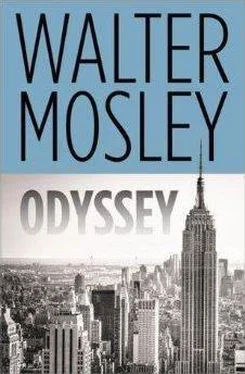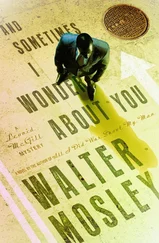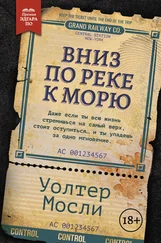“The last time I spoke to you, you were blind, Mr. James,” Captain Turpin said an hour after he’d nearly killed Lemuel Johnson.
They were sitting in his living room, the sun still streaming. A uniformed policeman stood next to the high counter. Sovereign sat on the white sofa while Turpin took the red chair.
“Yes,” he said. “I was. It was a psychological condition but I really couldn’t see a thing.”
“And when was this psychological condition cured?”
“I walked in here blind, Toni screamed, and suddenly I could see the young man raising his cudgel.”
He could also see then that the captain didn’t believe him. Despite her Caucasian name and diction she was amber skinned, possibly from Puerto Rico or farther south. She wore a dark maroon dress with an off-white jacket and a blue shoulder bag. She was slender and hard-eyed, not pretty but beautiful to someone.
“You expect me to believe that you miraculously regained your vision just in time to fend off Johnson?”
“It’s all I can tell you, Captain. I was more surprised than anyone else. I had just come home from a specialist who hasn’t been able to help me. I’ve been going to therapy five days a week...”
“How did you meet Toni Loam?”
“I called her after you gave me her name.”
“Why?”
“She saved my life.”
“But she knew your assailant.”
“I don’t get what you mean,” Sovereign said, realizing he was still a little stunned. “Are you saying that because she knew Lemuel, she didn’t save me?”
“Lemuel?”
“That’s what Toni called him. It’s his name.”
“Why did she have the key to your apartment?”
“I hired her to help me get around.”
“And what was she doing with the man who allegedly attacked you on the street and also, you say, in your apartment?”
“I know it sounds odd,” Sovereign said. “I mean, none of it makes much logical sense... from the outside, that is. But everything I’m telling you is true.”
“That you were blind, but not really,” she said. “That you hired the woman who was with the man who beat you on the street. That a woman screamed and inexplicably your sight, which you never really lost, came back. That a man, even though half your age and a head taller, armed with a bludgeon, was no match for you in a fight and you beat him into a coma in front of a dozen witnesses on Washington Street.”
Turpin had a mole on her right cheek. Sovereign considered this blemish seriously and for quite a few seconds before saying, “Essentially, yes.”
“I’m sorry, Mr. James,” Captain Turpin said. “But I’m going to have to arrest you for aggravated assault. Let’s hope it doesn’t get any worse than that.”
After walking home from his session with Offeran, Sovereign went to his apartment for the first time since his arrest. He’d spent the night in police custody. They questioned him for many hours. It wasn’t the captain, whom he liked, but two detectives, Martin Quick and Patrick O’Lande. They were both white men, younger and shorter than Sovereign. He didn’t know why their age and size meant so much to him, but he found it hard to take them seriously.
The interrogators had various interpretations of the events that weren’t true. They thought, as Offeran suspected, that maybe Toni and Sovereign plotted together to kill Lemuel but the kid ran and Sovereign lost his cool ( cool — that was the word Quick used) and beat him like a dog.
Added to this was the supposed intelligence that they had gathered, reporting as fact that Sovereign had never been blind and had been planning a crime like this for months. He was bent, a psychopath who, after being attacked by Johnson, plotted his revenge on the unsuspecting mugger.
“If he dies you’re going down for murder,” Quick said. He had a squashy face dominated by a shapeless nose.
“How is he doing?” Sovereign asked.
“Do you really care?” Patrick O’Lande asked.
“I didn’t even know I was hitting him,” Sovereign replied. “I mean, after he ran from my place.”
“So now you got amnesia on top of made-up blindness?” Quick said.
“I’m not going to win this argument with you, am I, gentlemen?”
Both cops sat back in their metal folding chairs looking bothered.
The only reason for this reaction, Sovereign thought, was that they weren’t used to being called gentlemen by criminal suspects.
“All you have to do is tell the truth,” O’Lande said at last.
“Can I ask you something first?”
“What?” Quick said.
“You don’t believe that I was blind and that my sight came back when Toni Loam screamed; am I right about that?”
“It’s hard to believe,” O’Lande admitted. He was younger than his partner by ten years or so, and handsome. His hair was strawberry blond and his features mild but manly. “Coincidences almost always point to guilt.”
“So,” Sovereign said haltingly, “the only truth is that I need a lawyer who will believe what you guys do not.”
They left him locked in the interrogation room, alone, for the rest of the night. The only reason James could see for this was that Turpin liked him and was maybe unsure about his guilt. They could have thrown him in a cell with dozens of hardened criminals but instead he got a pass: his own private room with a table and chair. There was also a rumpled newspaper, the New York Post , in a plastic trash can.
For years, until his condition, Sovereign eschewed the news in any form — radio, television, or print. These mediums, he believed, rarely told the truth. But in that room — by himself, after almost killing a man, regaining his sight, and understanding that in some way he loved the sour-faced young woman who simultaneously put him in harm’s way and saved him — in that room he read every article from politics to sports.
In the morning, through his court-appointed lawyer, Gilda Meyers, Sovereign pleaded not guilty due to compelling extenuating circumstances, and the prosecutor didn’t argue about low bail.
He immediately went to see an old friend from college, Lena Altuna. Lena had been a public defender for fifteen years before she went into business for herself.
“I don’t know, Sovy,” the forty-seven-year-old New Yorker said.
“You don’t know what?”
“This will be a hard enough case to win without you paying for Miss Loam. The guilt lies with either you, her, or both of you together conspiring against Mr. James. He is the victim no matter his intentions.”
“But I don’t believe she was trying to hurt either one of us,” Sovereign argued. “At least not physically.”
“Shouldn’t you know that before championing her case? Especially since it will weaken any argument you might make.”
“Get somebody to bail her out,” James offered. “Tell them to have her get in touch with me and I will make up my mind whether or not to help in her defense.”
“That’s not an advisable course, Sovereign.”
Lena had olive skin and incongruous green eyes. Her face was long and filled with longing — longing for justice, Sovereign had often thought. They saw each other only at five-year class reunion parties. Every time they met she went on long diatribes about how the nonwhite, poor, and elderly populations never got a fair shake.
Sovereign liked her commitment; he had felt that his secret actions at work equaled hers. Now, however, he doubted himself.
“While I was blind she was kind and generous to me,” Sovereign said. “I can’t turn my back on her without finding out her motives on my own.”
Lena stared at James for a while before saying, “All right, Sovy. You win. I’ll have someone post her bail. But she will be advised on the case as her lawyer sees fit.”
Читать дальше












